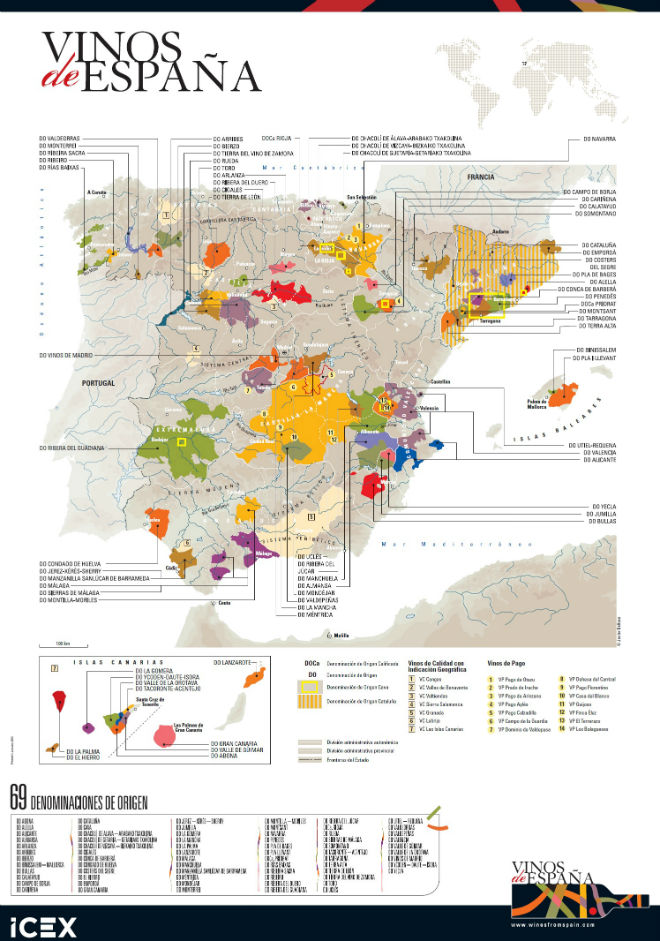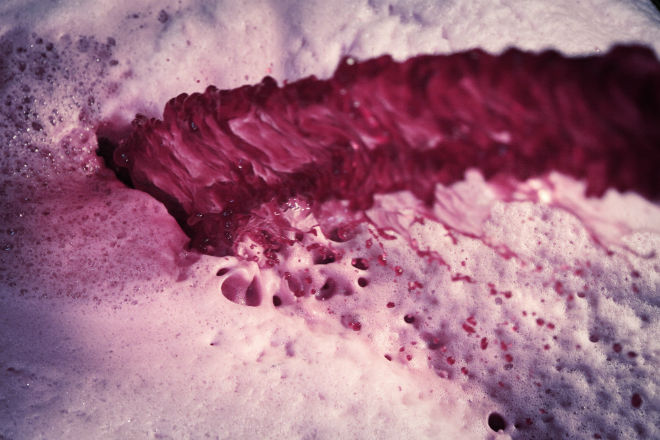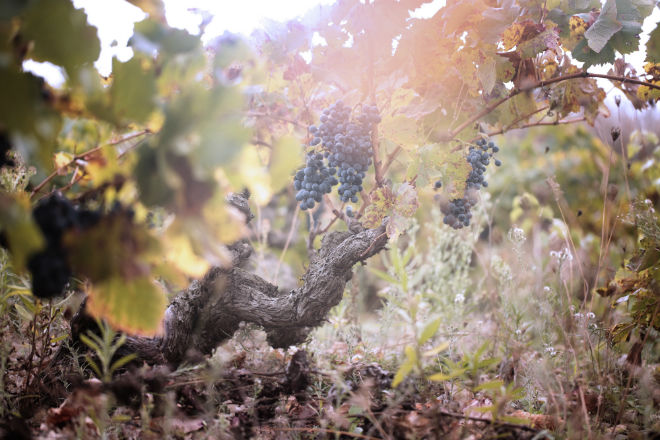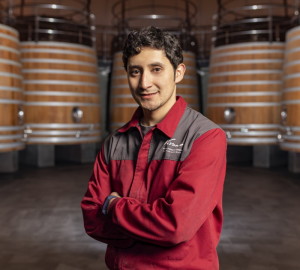We are increasingly interested in buying products of real quality and that is why we give the importance it deserves to products with Spanish Denomination of Origin.
But do we know exactly what this qualification consists of?
DESIGNATIONS OF ORIGIN IN SPAIN
The Protected Designations of Origin (D.O.), also called Protected Designations of Origin (P.D.O.), are the system used in our country for the recognition of a differentiated quality, a consequence of its own and differential characteristics due to the geographical environment in which the raw materials are produced, the products are elaborated and the influence of the human factor that participates in them.
We are passionate about wine and when it comes to tasting it, it is very important to know where it comes from because the taste and quality can vary greatly depending on its origin.
For a wine to obtain the Denomination of Origin it must meet the following requirements:
- The wines must be made in the region or specific place of the Designation of Origin with grapes exclusively from that geographical area.
- They must have special characteristics and quality that can only be achieved thanks to the geographical environment in which they are produced.
- They must have a high reputation for their origin in the market.
- To be recognised as a Denomination of Origin, at least five years must have elapsed since the wine was recognised as a product of that area.
In Spain we have a total of 70 Designations of Origin for wine. If you want to know what they are, here is a list:
- Abona
- Alella
- Alicante
- Almansa
- Arlanza
- Arribes
- Bierzo
- Binissalem-Mallorca
- Bullas
- Calatayud
- Campo de Borja
- Cariñena
- Catalonia
- Cava
- Chacolí de Álava
- Chacolí de Getaria
- Chacolí de Vizcaya
- Cigales
- Conca de Barberá
- Condado de Huelva
- Costers del Segre
- El Hierro
- Empordá
[/one_third][one_third][one_third]
- Gran Canaria
- Jerez-Xérés-Sherry
- Jumilla
- La Gomera
- La Mancha
- La Palma
- Lanzarote
- Malaga
- Manchuela
- Manzanilla Sanlúcar de Barrameda
- Méntrida
- Mondéjar
- Monterrei
- Montilla-Moriles
- Montsant
- Navarra
- Penedés
- Pla de Bages
- Pla de Llevant
- Priorat
- Rías Baixas
- Ribeira Sacra
- Ribeiro
[/one_third][one_third_last] [one_third_last][one_third_last
- Ribera del Duero
- Ribera del Guadiana
- Ribera del Júcar
- Rioja
- Rueda
- Sierras de Málaga
- Somontano
- Tacoronte-Acentejo
- Tarragona
- Terra Alta
- Tierra de León
- Tierra del Vino de Zamora
- Toro
- Uclés
- Utiel-Requena
- Valdeorras
- Valdepeñas
- Valencia
- Güimar Valley
- Orotava Valley
- Wines of Madrid
- Ycoden-Daute-Isora
- Yecla
[/one_third_last] [/one_third_last

Map of the Wines of Spain. Source: WinesfromSpain
THE QUALIFIED DESIGNATIONS OF ORIGIN IN SPAIN
Wines with a Qualified Designation of Origin (D.O.Ca.) deserve a higher category. To obtain this qualification, in addition to the requirements of the Denomination of Origin explained above, they must meet the following characteristics:
- Wines have to go through a control system from production to marketing to guarantee the quality and quantity of the wines.
- All wine produced must be sold bottled.
- At least ten years must have passed since their recognition as wines with Designation of Origin.
- There must be a cartographic delimitation, by municipality, of the land suitable for the production of DOCa wines.
In Spain there are only two Qualified Designations of Origin: Rioja and Priorat (Priorat in Catalan).
DOCa RIOJA
The Rioja Denomination of Origin obtained its Qualified Designation of Origin in 1991.
The wine-growing region of Rioja wines extends along both banks of the river Ebro, bounded by the Sierra de la Demanda and the Sierra de Cantabria. There are three production areas, Rioja Alta (municipalities in La Rioja and the province of Burgos), Rioja Baja (municipalities in La Rioja and Navarre) and Rioja Alavesa (municipalities in the province of Alava, Basque Country).
The vineyards are planted on calcareous clay soils in the higher areas and ferruginous clay and alluvial soils in the lands near the rivers.
In terms of climate, the whole area benefits from the combination of the Mediterranean climate (typical of the Ebro valley) and the Atlantic climate (due to its proximity to the Cantabrian Sea). Thus, temperatures are mild throughout the year and rainfall is stable (350-450 mm per year). These two factors, plus the many hours of sunshine per year (approximately 2,800) and the altitude of the vineyards (350-650 m) make the area an ideal environment for vine growing.
DOCa PRIORATO
The Priorat Designation of Origin was awarded its Qualified Designation of Origin in 2009.
This appellation is located in the province of Tarragona and is made up of 9 municipalities: Bellmunt del Priorat, Gratallops, El Lloar, El Molar, La Morera de Montsant Poboleda, Porrera, Torroja del Priorat, La Vilella Alta and Baixa.
The vineyards are planted on Llicorella soils (red and black slate with small particles of mica - quartzite - which reflect and retain heat).
With a continental climate, temperatures in the area are very high in summer (very long and dry) but can drop to around -4º in winter. Rainfall varies between 400mm. and 600 mm. and there are about 2600 hours of sunshine per year. The altitude of the vineyards varies between 100 and 700 metres approximately.
The latest data available from the 2012/2013 wine year for wines with Designation of Origin show that the total sales of the Protected Designations of Origin reached 11,402,901hl.
If you are interested in knowing which are the Autonomous Communities that sell the most wine, we have compiled a list in which the 20 most important Designations of Origin are listed in order according to their total sales volume (domestic + foreign):
- D.O.Ca. Rioja (La Rioja)
- D.O. Cava (Catalonia)
- D.O. La Mancha (Castilla La Mancha)
- D.O. Ribera del Duero (Castilla y León)
- D.O. Valdepeñas (Castilla La Mancha)
- D.O. Valencia (Valencian Community)
- D.O. Rueda (Castilla y León)
- D.O. Cariñena (Aragón)
- D.O. Catalonia (Catalonia)
- D.O. Navarra (Navarra)
- D.O. Jerez-Xérès-Sherry (Andalusia)
- D.O. Utiel-Requena(Comunidad Valenciana)
- D.O. Jumilla (Murcia)
- D.O. Montilla-Moriles (Andalusia)
- D.O. Rías Baixas (Galicia)
- D.O. Campo de Borja (Aragón)
- D.O. Penedés (Catalonia)
- D.O. Alicante (Comunidad Valenciana)
- D.O. Condado de Huelva (Andalusia)
- D.O. Somontano (Aragón)
What do you think of products with Designation of Origin and do you think they are a guarantee of quality?





















I would like to know if in addition to the 69 d.o. wines that we have in Spain, we have another one, such as the d.o. cangas in Asturias.
thank you
Hello Samuel,
Indeed, the wines of Cangas now have their own Protected Designation of Origin. Due to the fact that until recently it was an area of Quality Wines with Geographical Indication, this is how it appeared on the map that we show. However, it is absolutely right that it is now a P.D.O. and we will show it as such from now on.
Thanks Samuel and don't forget to stop by!
We will have to try the first three because I have tried some of the list and if I liked it a lot, I hope to do it this summer that is approaching, greetings.
Good morning.
I would like to know if there is any study of the consumption of bottled wine of the different D.O. by provinces.
It seems logical to think that the most consumed will be the local ones and the most popular ones such as La Rioja, Ribera del Duero, Cava, etc...
Best regards
Hello Jorge,
We are not aware of any studies on this subject, we are sorry to say.
Good luck in your search!